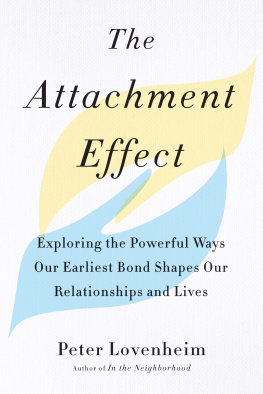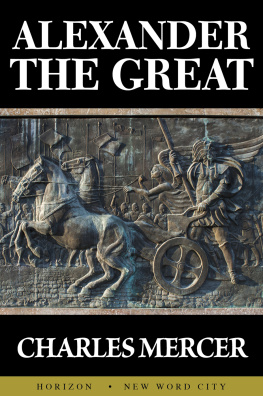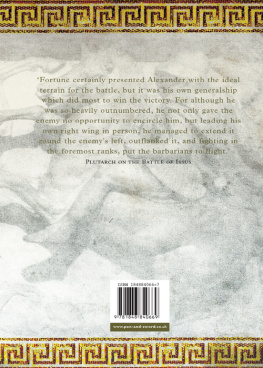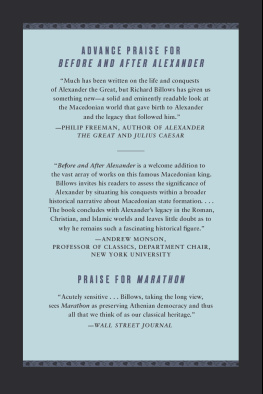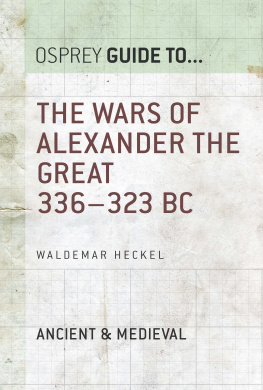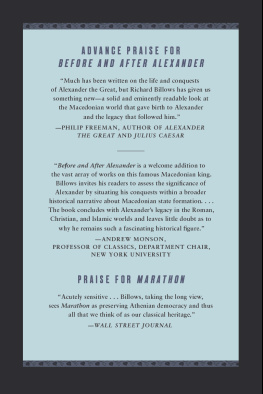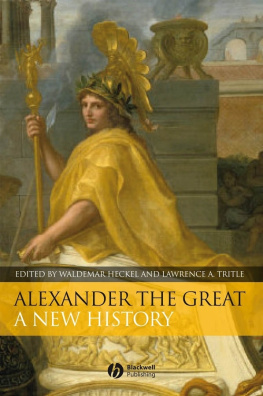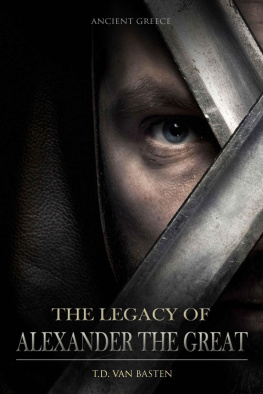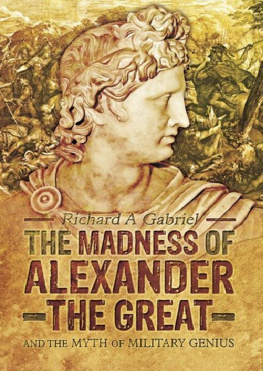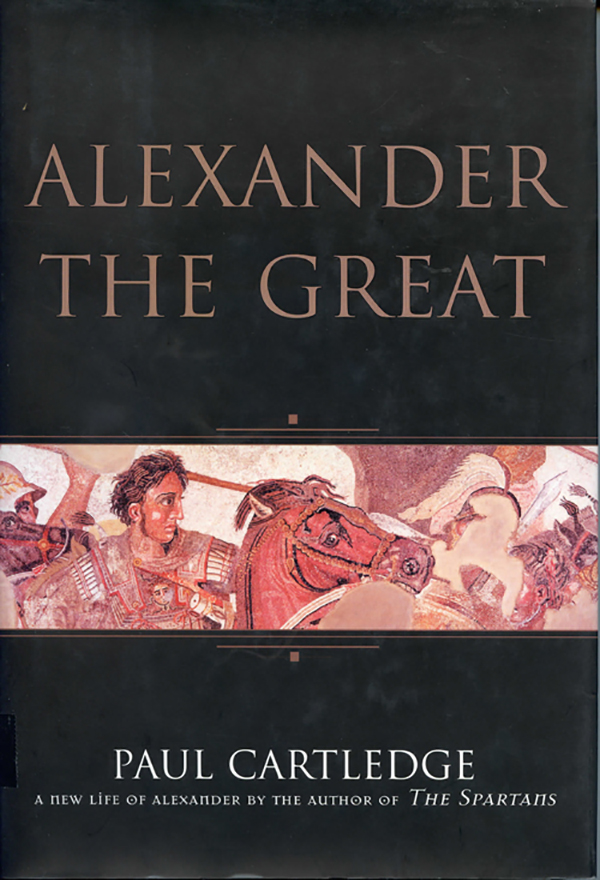First published in the United States in 2004 by
The Overlook Press, Peter Mayer Publishers, Inc.
Woodstock & New York
WOODSTOCK:
One Overlook Drive
Woodstock, NY 12498
www.overlookpress.com
[for individual orders, bulk and special sales, contact our Woodstock office]
NEW YORK:
141 Wooster Street
New York, NY 10012
Copyright 2004 by Paul Cartledge
All rights reserved. No part of this publication may be reproduced or transmitted in any form or by any means, electronic or mechanical, including photocopy, recording, or any information storage and retrieval system now known or to be invented, without permission in writing from the publisher, except by a reviewer who wishes to quote brief passages in connection with a review written for inclusion in a magazine, newspaper, or broadcast.
ISBN 978-1-5902-0842-7
To Judith Portrait
(yet again)
There is really no need for any special justification, let alone apology, for a new history of Alexander. He is one of those very few genuinely iconic figures, who have both remade the world they knew and constantly inspire us to remake our own worlds, both personal and more global. What is needed, then, and I have aimed to provide, is a book that does full justice to Alexanders extraordinary achievement, while at the same time respecting the limits of the evidence and of the historians craft. I have attempted to address that achievement both in its own terms (including some tentative probing into Alexanders deep psyche) and in terms of its subsequent impact which continues to this day, when Alexander is still prayed in aid by fishermen in Greece, cursed as a thief in Iran, and worshipped as a saint in the Coptic Church of Egypt.
It must also be a book with a distinctive interpretative approach, and mine is indicated in the books subtitle: The Hunt for a New Past. There are of course several possible keys to unlocking the enigma that was Alexander. Some modern historians, for example, have focused on the Greek word pothos, passionate yearning, which is associated in the sources with major projects of Alexander. Others have privileged Alexanders relationship with his father, Philip. One modern historian has tried to explain vital features of his career in terms of his alcohol dependency. My book will not minimize the influence of these factors on Alexanders outlook, personality and aims. But it will lay even more stress on his predilection, or rather grand passion, for hunting game: human as well as animal, and the bigger, more numerous and more dangerous the better. For that offered him a greater chance for enhancing his standing and his fame.
One of the very earliest probable images of Alexander () is painted in a fresco above the front entrance to what most of us refer to conventionally as the Tomb of Philip (whether or not we actually believe it to be the tomb of Alexanders father, as I on the whole do). This monumental edifice was erected at the ancient Macedonian ceremonial capital of Aegae (modern Vergina) at some point in the last third or so of the fourth century BCE . The fresco depicts a series of hunting scenes, so that, if it does indeed feature Alexander centrally, it shows him engaged in what we know to have been one of his favourite pastimes. Except that pastime may give a misleading impression, since hunting in Macedon as in some other ancient societies, such as Sparta was a culturally coded marker of social and political status and prestige. In Macedon, you did not become fully a man until you had passed the key manhood test of hunting and killing, without a net, one of the ferocious wild boar that roamed the heights of Upper (western) Macedonia. Only then could you recline as opposed to sit when participating in the daily ritual of the symposium: the evening drinking party, at which and through which the Macedonian elite celebrated together and mutually confirmed their elevated social and political status. Another kind of hunting the killing of an enemy in battle entitled a Macedonian to wear a special belt, as a visual signal and reminder of his attainment and prestige.
After the two introductory chapters I have aimed to combine sequential chronological narration with in-depth systematic surveys of a number of key themes of Alexanders career. A detailed Timeline right at the start of the book is intended to help convey the flow of events. All dates are BCE (Before the Common Era), unless otherwise specified. The concluding chapter explores Alexanders multiple legacies, from antiquity through the Middle Ages to the present day.
An Appendix explores the limits set by the available source materials to any attempted reconstruction of how it actually was in Alexanders day. The conclusions reached here condition and inform everything I write in the main body of the book, which ideally should be read in that light. The Appendix also explores in greater detail than usual two vital questions: first, how precisely did Callisthenes, Alexanders official historial, die in 327? And, second, what did really happen at the oracle at Siwah in 332/1? The contemporary narrative sources, as ever, do not survive as such, and the available reports of at least the main authors all tell different stories. This really does matter, because these were issues over which Alexander himself quite certainly took great care to control the flow of information, and one of the many paradoxes of his career is that, despite or because of that concern, the facts are so often murky and controversial. For reasons given here, too, various sorts of material objects lie at the very kernel of this historical enterprise. The illustrations of these objects are therefore not merely an optional extra but a key component of the history any history of Alexander. They have been selected with a view to combining the familiar with the unfamiliar, the spectacular with the ordinary, the decorative with the documentary.
The book concludes with a series of technical aids: a Table of Achaemenid Kings, a Dramatis Personae (register of prominent individuals), a Glossary (including place names, and a Bibliography). The authors and works referred to in the text can usually be found listed in the relevant chapters suggestions for further reading in the Bibliography. Some of the suggestions are aimed more particularly at the scholar than the general reader but general readers, too, will assuredly find plenty here to stimulate them further.
Terminology: I use Macedon as a political term to refer to the state or kingdom of Macedon that Alexander inherited and that was the ultimate basis of his position and power. Macedonia is for me a geographical term, referring to the territory that formed the core of the state/kingdom of Macedon. Occasionally, these two terms overlap. Greater Macedonia refers to the enlarged territory conquered and consolidated as a state by Philip, the northern frontier of which Alexander sought to extend as far as the Danube. In much Western literature Persia and Iran have been used interchangeably, but strictly Persia (Persis in Greek) is the heartland of the Persian people, occupying a mountainous region northeast of the Persian Gulf; whereas Iran embraces also ancient Media to the north, and some more. In this book Iran means the area of modern Iran, and Persia the state or empire of the Achaemenid Persians.
Monetary Equivalents: I have not tried to translate ancient monetary figures into modern equivalents. A silver Greek talent (a word of Babylonian origin) contained 100 minas or 6,000 drachmas. Two to three drachmas a day was a skilled workmans wage in Alexanders time. To be seriously rich, the equivalent of a sterling or dollar millionaire, you had to be worth three or more talents, probably. So when Harpalus ran off with 5,000 talents in 324, or when Alexander gained access to Persian treasure worth perhaps 180,000 talents in 330, we are dealing with very big numbers indeed.







